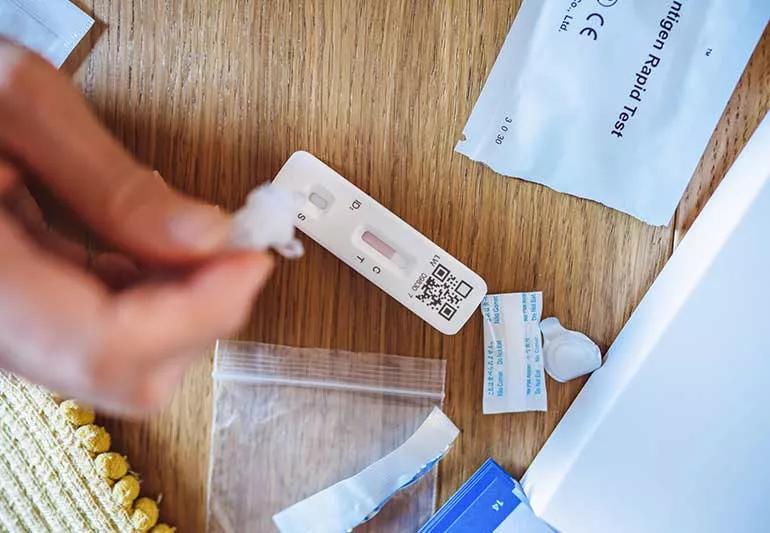Antibodies used to detect the virus can weaken over time, so results may not be reliable

You’ve got a fever, a cough and feel exhausted — symptoms that are common with COVID-19. You’d like to take an at-home test, but when you go to grab one from your medicine cabinet, you realize it’s expired.
Advertisement
Cleveland Clinic is a non-profit academic medical center. Advertising on our site helps support our mission. We do not endorse non-Cleveland Clinic products or services. Policy
What should you do? Is it OK to still use an expired COVID-19 test? Are expired COVID-19 tests accurate?
Microbiologist and pathologist Daniel Rhoads, MD, explains why at-home COVID-19 tests expire and what kind of results you may get if you use one.
Yes. At-home rapid antigen COVID-19 tests expire. These at-home tests are used to collect a sample from inside your nose to measure it against COVID-19 antibodies that are stored in the testing strip.
While certain parts of the at-home test kit like the swab don’t expire, there are parts like the vials of liquid and testing strips that do.
“There are SARS-CoV-2-antigen-specific antibodies in the test — that’s what the test relies upon for its reliability. The antibodies in the test capture the antigen that’s part of the virus,” Dr. Rhoads explains. “So, those antibodies can go bad over time. They’re little pieces of protein, so they can deteriorate over time.”
If there’s liquid in the test, it can potentially evaporate over time, which means you won’t have enough liquid volume to properly conduct the test.
So, can you use an expired COVID-19 test?
First, it’s important to make sure that your at-home test is actually expired.
“The expiration date listed on the package might not be its actual expiration date,” notes Dr. Rhoads. “When manufacturers first released these tests, they had conservative expiration dates. As they do additional studies and demonstrate that the expiration date can be pushed back, then they can extend it. But the boxes have already been distributed, with the original expiration date already listed on it.”
Advertisement
To check your COVID-19 test expiration date, Dr. Rhoads recommends verifying it with the U.S. Food and Drug Administration’s (FDA) website. It lists the manufacturer’s name, the name of the test and any extended expiration dates. In some cases, you can compare lot numbers from an at-home test box against the list. Many tests have had their expiration dates extended anywhere from 15 to 22 months.
If you have a test that has an extended expiration date, your test should work and give you accurate results. But if you have an expired test, Dr. Rhoads says the FDA advises against using it to determine if you have COVID-19, as the results might not be accurate.
“Scientifically, it doesn’t make sense to get a false positive using an expired test,” states Dr. Rhoads. “The concern would be for you to get a false negative. If the antibodies stopped working as well, then the test might not detect the virus as well as it could when it was initially manufactured.”
If you have symptoms or were in close contact with someone who has COVID-19, you should either use an at-home test that isn’t expired or have a polymerase chain reaction (PCR) test done.
You want to keep your at-home COVID-19 tests in a dry place — and keep your tests in their original packaging.
“They’re usually packaged pretty well, but I’d keep them where you keep your medicines in a cool, dry place,” advises Dr. Rhoads.
This is important because factors like extreme heat or cold can affect results. And you want to keep at-home tests out of reach of children and pets.
Whether you want to stock up on at-home tests or get one whenever you need to test, that’s up to you.
“If you feel that you want to be able to test on a moment’s notice, you should keep one on hand,” encourages Dr. Rhoads.
If you’re experiencing symptoms or have come in contact with someone who has COVID-19, the FDA recommends testing more than once and every couple of days if using antigen tests.
Knowing for sure if you have COVID-19 can help you prevent the spread of the virus to others and also help your healthcare provider select the best COVID-19 treatment or management strategy for you.
But overall, the best defense against severe COVID-19 is getting your vaccination and staying up to date with any boosters recommended by the U.S. Centers for Disease Control and Prevention (CDC).
Advertisement
Learn more about our editorial process.
Advertisement

Most can return to work or school when they’re symptom-free for 24 hours

Covering your mouth when you cough and staying home when you’re sick are a couple ways to help keep yourself and others COVID-free

This vital nutrient supports your health, but its role in COVID-19 prevention and treatment isn’t proven

Studies have shown promising results, but additional research is needed

Infection and inflammation can cause you to lose your voice and have other voice changes until you’re fully healed

A COVID-19 infection can bring on depression or anxiety months after physical symptoms go away

Just like the flu, COVID-19 continues to evolve every year with new and smarter variants

The latest omicron subvariants carry specific mutations that may allow the SARS-CoV-2 virus to be better at evading immune protection

Wearing a scarf, adjusting your outdoor activities and following your asthma treatment plan can help limit breathing problems

Your diet in the weeks, days and hours ahead of your race can power you to the finish line

When someone guilt trips you, they’re using emotionally manipulative behavior to try to get you to act a certain way